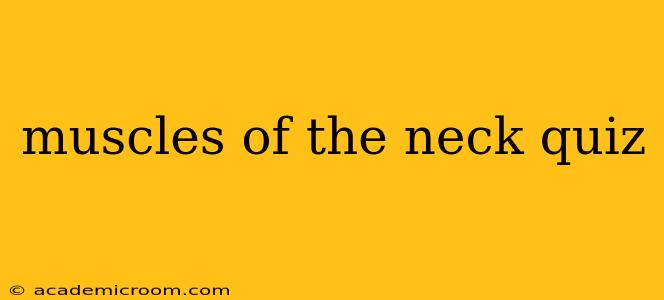Test Your Knowledge: A Muscles of the Neck Quiz
The neck, a crucial region connecting the head and torso, boasts a complex network of muscles responsible for a wide range of movements, from subtle head tilts to powerful swallowing actions. This quiz will test your understanding of these vital muscles. Prepare to flex your anatomical knowledge!
Instructions: Choose the best answer for each multiple-choice question.
Question 1: Which muscle is the primary muscle responsible for flexing the neck (bending the head forward)?
a) Sternocleidomastoid b) Trapezius c) Splenius capitis d) Scalenes
Answer: a) Sternocleidomastoid
Question 2: The sternocleidomastoid muscle has attachments to which of the following bones?
a) Sternum and clavicle only b) Sternum, clavicle, and temporal bone c) Clavicle and occipital bone d) Sternum and occipital bone
Answer: b) Sternum, clavicle, and temporal bone
Question 3: What is the primary action of the trapezius muscle concerning neck movement?
a) Flexion b) Extension c) Lateral flexion and rotation d) Depression of the scapula only
Answer: c) Lateral flexion and rotation (though it also contributes to extension and upward rotation of the scapula)
Question 4: Which group of muscles located deep in the neck is crucial for respiration and neck flexion?
a) Splenius muscles b) Scalenes c) Suboccipitals d) Suprahyoids
Answer: b) Scalenes
Question 5: Which of the following muscles is NOT directly involved in head rotation?
a) Sternocleidomastoid b) Splenius capitis c) Levator scapulae d) Semispinalis capitis
Answer: c) Levator scapulae (primarily involved in scapular elevation and downward rotation)
Question 6: The suboccipital muscles are located where and are responsible for what actions?
a) Deep in the neck; responsible for neck flexion b) Superficial in the neck; responsible for head rotation c) Deep in the neck; responsible for fine head movements and stability d) Superficial in the neck; responsible for swallowing
Answer: c) Deep in the neck; responsible for fine head movements and stability
Question 7: What muscle group elevates the hyoid bone, aiding in swallowing and speech?
a) Infrahyoids b) Suprahyoids c) Scalenes d) Suboccipitals
Answer: b) Suprahyoids
How did you do?
- 6-7 correct: You're a neck muscle master! Your knowledge of cervical anatomy is impressive.
- 4-5 correct: You have a good understanding of the major neck muscles. Further study will solidify your expertise.
- Less than 4 correct: Don't worry! Learning the muscles of the neck takes time and effort. Review the information and try again.
Frequently Asked Questions about Neck Muscles
Here are some commonly asked questions about the muscles of the neck, answered to deepen your understanding.
H2: What are some common neck pain causes related to muscles?
Neck pain often stems from muscle strain, overuse, poor posture, or injuries. Tightness in muscles like the sternocleidomastoid, trapezius, and levator scapulae are frequently implicated. Conditions like whiplash can also significantly impact neck muscles.
H2: How can I strengthen my neck muscles?
Gentle, progressive exercises like neck isometrics (holding your head against resistance) or range-of-motion exercises can strengthen neck muscles safely. Always consult a healthcare professional or physical therapist before starting any new exercise program, especially if you experience neck pain.
H2: What are some stretches to relieve neck muscle tension?
Gentle neck stretches, such as tilting your head to the side, gently rotating your head, and chin tucks, can help alleviate tension. Remember to perform stretches slowly and avoid forcing any movement.
H2: What are the different layers of neck muscles?
The neck muscles are organized into superficial, intermediate, and deep layers. Superficial muscles are generally larger and involved in broader movements, while deeper muscles tend to be smaller and involved in finer motor control.
This quiz and information provide a foundation for understanding the complex network of muscles in the neck. Remember to consult with a healthcare professional for any concerns about neck pain or muscle issues.
